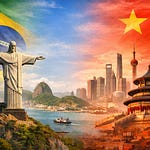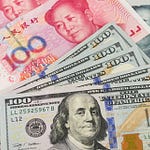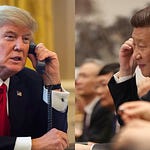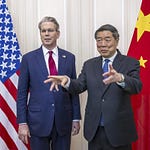Stimulus Policies
Economic and Societal Trend in Another Representative Lower Tier City - Leshan
Highlights
Part 1:Stimulus Policies
Which part of the CSRC’s(China Securities Regulatory Commission) Aug 28 2023 policies really matters
“On the surface, it's the stamp duty tax that most people pay attention to because it's the simplest one and carries a lot of historical connotations.”
“The most important thing is this specific restriction on controlling shareholder sell-down. This is the first time that, in China, for a controlling shareholder to sell down shares, you have to first be able to not only be profitable but also distribute part of your profit to your shareholders by way of dividends.”
Why is the government not doing a “quick and impactful” policy like what they did in 08-09
A switch from “high-speed growth” to “high-quality growth”
The size of the Chinese economy has 4x since 08
The Chinese economy has become more complex, so requires more sophisticated policies, and it takes longer time to be effective
There are ways to get more visibility into China’s policy-making process.
Look into the scholars, think tanks, and researchers that serve as advisors to the government, and read their recent work to understand what the government cares about. Their name is sometimes publicized. For instance, this is the latest economic scholar reporting session at the State Council: http://politics.people.com.cn/n1/2023/0706/c1024-40029765.html
Part 2: Economic and Societal Trend in Another Representative Lower Tier City - Leshan
Unlike Gaoyou which we wrote about, Leshan does not have an industrial complex but has built a tourism and cultural industry that drove its GDP to reach RMB 230bn in 2022.
The growth of its tourism industry is driven not just by Leshan’s natural resources but also by meticulously designed government policies.
Government officials in China operate under KPIs and are incentivized to deliver results as they want to climb the government ladder.
People were leaving lower-tier cities because its software (services and culture) did not catch up with modernized infrastructure
Though they left their hometown, entrepreneurs from lower tier benefited from their heritage as they can understand the larger mass consumer market in China. In turn, they would use their success to contribute to the growth of their hometown.
Reverse urbanization is underway in China, not just from the supply side (more modernized hometown) but also from the demand side (higher costs to stay in tier-1 cities), and we expect to see new changes.
Full transcript
Mu: August 28th, the CSRC rolled out a stream of policies that seem to be significant, including cuts on trading stamp tax. It was rolled out once 16 years ago, and there was a restriction on sell-down by controlling shareholders. Also, a restriction on new IPO offerings. These are actually treated as material policy, but when we look at how the market reacted on Monday, the share price of A-share stock market jumped 5%, but then quickly declined to 1%.
It seems like the investors and the market are not completely buying into the power of the policy. But just looking at the sub-markets. So Robert, what's the significance of these policies? Which part do you think is the most significant part?
Robert: It's a whole bundle of policies, and the different pieces of that policy bundle carry different significance.
On the surface, it's the stamp duty tax that most people pay attention to because it's the simplest one and carries a lot of historical connotations. Last time they cut this down was around the 07-08 period. And it did give quite a boost to the market prices at the time. So, with that memory in mind, a lot of people pay attention to this part, and a lot of people are asking over and over again, when will the government reset and decrease the stamp duty tax.
But with that said, stamp duty tax in China is already very, very low. It was only 0.08% of the trade, both ways included before they slashed it down again this time. So for example, if you're just trading 100,000 Yuan doing that trade, you only pay 80 Yuan for tax, which is almost nothing.
So by cutting down on that, it carries way more symbolic value than actual value. Unless if you are more of a quantitative, high-frequency trading fund. Apart from those guys, if you're just a retail investor, if you are typical fundamental investors or a corporate, this won't affect much of your decisions anyway.
So I do not think that's the most significant piece. Although it's the instant and also the headline-grabbing piece of those policy bundles. Among the several policies they introduced last weekend, there are actually very significant and impactful policy changes.
I think the most important thing is this specific restriction on controlling shareholder or largest shareholder sell-down. This is the first time ever that, in China, for a controlling shareholder to sell down shares, you have to first be able to not only be profitable but also distribute part of your profit to your shareholders by way of dividends.
So, if you don't do that, if you don't make money for your shareholders, then you have no rights to sell down shares. So this is the first time they tie shareholder returns to the controlling shareholders' interests. And why is that significant? That's because the Chinese stock market was and is a very young capital market.
They only started this whole thing in the beginning of the last decade of last century. So it's barely over thirty years old. Imagine you put the whole economy of a country onto a capital market. That market will serve mostly one purpose, which is to do fundraising for the corporates, for the companies, the listed companies, to do fundraising for these companies and fundraising for their shareholders. So essentially for the last few decades, the capital markets are a fundraising machine for the fundraisers and usually at the expense of investors.
So someone did a statistics before just to look at each year, how much of the cash that is being distributed to the shareholders, through dividend, through share repurchases, and how much of the cash is kind of sucked by the markets, from IPOs, from sell-downs, and etc.
Mu: I remember that statistic. I think that the outflow to the corporate executives or the founders is actually larger than the money that's being raised by the capital market or by the A-share market.
Robert: Yes. It has been like that consistently for many years. And that is one of the big problems for the investors in China's onshore capital markets.
They're just an endless supply of more and more shares. There is a limited supply of cash, new cash inflow to the market. This piece of the regulation is served to address this problem, finally. Is it a good policy? From a free market perspective, it's a little bit too much intervention.
In a mature capital market, you cannot imagine the government creating this kind of restriction on shareholder sell-down. But again, the Chinese capital market is not mature. It is within this immature context. They have to find ways to address problems of the time.
So they introduced this piece. And why doesn't the market respond more cheerfully to these kinds of reforms? Well, as I said, the stamp duty tax is insignificant. So you do see this short term excitement in the, at least in the first few minutes when the market opened this week. But the more significant part, for example, the shareholder sell-down part, this is more long term, more structural, and it does take long term forces, long term developments for the consequence of this kind of policy to really materialize. People have to be patient to see how this kind of policy can create for the markets. It's sort of creative that you can implement a policy to require the Company management or the major shareholder, founding shareholder to make a profit for the rest of the shareholders before they can cash out. That definitely sounds unique in some sense right that you're implementing some sort of requirement. And I can understand you will take time for implementing it.
Mu: Actually, the majority shareholder can have other ways to cash out their share, still, even given the new policies. There will be many creative ways to bypass that. Yeah, the way I can think of it is one is to pledge their shares, to have a loan about it.
Mu: The other thing that we talk about is that we see the government rolling out stimulus slowly. But when we compare that to 08-09, it was more direct. Yeah. 08-09, the government said they're going to roll out a 4 trillion RMB stimulus. There's a specific number. There's a material policy that people can refer to, so it's easier to understand. Why is the government not doing it this time?
Robert: Back then, we were really at another level of development for China, right? 2008, that's even pre-high-speed railway networks. Yeah. There is a lot of potential for urbanization. There's a lot of potential for big infrastructure projects. So the reason that they were able to respond in such a big way at the time was really there was enough demand to soak up all these stimuli.
We are now in a different period. The real estate problem, they were self-induced problems, but also the government realized, especially central government realized, it's just time is over for the kind of high-speed growth we have been used to, a few decades or a few years ago, so there's definitely limits for what the government can do.
Mu: I think another reason is that China's economy has grown so much since 08-09. Back then in 08, GDP of China was about 31 trillion RMB. 4 trillion out of 31 trillion is like 12 percent, 13 percent of GDP but for 2022, China's GDP has grown to over 120 trillion RMB. So if the government put in a few trillion RMB as stimulus, it may not work.
And secondly, is that the mechanism for direct stimulus takes longer to be effective, given the size of the economy, the complexity of the economy. So that's another reason that a more sophisticated, seamless policy and plan and framework need to be structured compared to 08-09. The other thing I got asked a lot by our readers is invisibility into the policy stimulus.
It echoes what you talked about in the last episode on government's transparency. So, from our readers' point of view as investors, as business people that are doing business planning, they always want to see some predictability in the economy or in how policy works. I think our readers actually might have a hard time understanding or getting visibility into how would the policy stimulus be rolled out for the next few months or for the next couple of years? Do you think there's a way to get some understanding on it?
Robert: Yeah, I definitely do. So, although the Chinese political system is quite different from the western ones, there are some essentially similar structures underneath.
For example, officially we do not have people like lobbyists. But that doesn't mean people who act as lobbyists don't exist. What I mean is, there are decision-makers and there are the general public, but in between, there are also areas or people who are constantly making advice to the government, mostly academics, think tank people, and also some of the professional political consultants, advisors, from a consultative conference.
There are these non-state actors, but who are also talking at the same time with the general public, at the same time talking with the government decision-makers, government agencies. I just advise people to pay more attention to many of these academics. Usually when they talk about some things, they will share some of their findings and their views. And there will be some public discussion of a certain topic and certain debates, and it could be reflective of the debates within the government system. And also especially pay attention to the advisors or academics that the highest layer of government or party have been talking with recently. Actually, a lot of these are public there are always study sessions, Politburo meetings involving some of the academics.
So, pay attention to this kind of activities of high-ranking officials and also to the people who are interacting with them will be quite beneficial for understanding these policy changes.
Mu: Yeah, that's one of the ways I learned to see visibility into the central government's policy-making processes or their thinking around it. We can post it on the show notes some of the names that we saw, publicly, that have been announced, to be an advisor or to be the invitees to the state council's economic studying sessions.
When you look at that, you can see that some of them are talking about industrial policies, some of them are talking about internal migration policies, the Hu Kou policies, some of them are talking about global international finance. When we look at, you know, their viewpoints, when we look at their research paper, some of them are publicly available, we can see what they would provide to the central government.
And when we look at the area they're studying, we can also see what the central government is focusing on, in the recent months or recent years.
Part 2: Further Discussion on Understanding China by Looking at its Lower Tier Cities
Mu: We have talked about the stimulus policies, which focus on the macroeconomics. Let's switch gear to look at what's going on on the ground at the micro level. We have published a very interesting article on a small town called Gaoyou in Jiangsu province in China, with 700,000 populations. I would like to talk more about this type of society and economy in China, which is rarely seen by the outside world.
After I read the article, I just learned about Gaoyou, but Gaoyou is actually quite representative of China. This kind of lower-tier city will be the focus of China's economic development for the next few years. At least that's our expectation. Amber, what do you think are the other lower-tier cities that are representative of China, with a very low profile?
Amber: I guess the first city that came to my mind is Leshan. Which is a low-tier, third or fourth-tier city, located about an hour away from Chengdu, Sichuan province.
Mu: One of the most famous things I know of Leshan is the big Buddha, Leshan.
Amber: Dafo. Yeah, the giant Buddha. The giant Buddha is quite spectacular because it's literally carved out the stones from the mountains, so it's entirely naturally made. It's amazing craftsmanship.
Mu: Yeah, that's my impression of Leshan. I'm guessing that's many people's impression of Leshan as well. But when we look at a city in China, we always fall into this generic imagination. And that's why we're going to talk more about it. Because when I look into the GDP and economy of Leshan, I was amazed.
They had a GDP of 230 billion last year. They had a faster growth rate than the nation. So, what's special about this city?
Amber: The unique feature is that the city has a lot of cultural heritage. In addition to the natural assets such as the mountains and the rivers, the long rivers.
It actually has a deep cultural heritage. For instance, if you've heard about Guo Moruo, which is a famous Chinese poet. It was born and raised in Leshan, so a lot of people in Leshan, they actually have this appreciation for the history, for the culture that made it very unique to develop the tourism industry, because people wanted to come down to see unique type of culture that they cannot see in the big cities.
My grandparents live in Leshan, so I pretty much visit them, every year, multiple times. Several years ago, when I went to Leshan, it's pretty much like a day trip, so you went there. Bought a ticket, went to see the Buddha, and you're pretty much done. But over the years, you actually see a variety of tourism, point of interest evolved over the years.
The catering, the restaurant scene is booming. You pretty much have hundreds of different street foods available if you visit Leshan. A lot of people actually went to Leshan to see the museum, which presents the history and connections of Leshan to Buddhism. So it's not just a giant Buddha. The city itself actually has a deeper connection to Buddhism
I've seen a lot of people, including foreigners. I've seen foreigners, even during the COVID period in 2021, they went to Leshan and they took longer trips. It's no longer a one day round trip from Chengdu anymore. Many people actually wanted to take a few more days in Leshan and just enjoy the relaxed, slow lifestyle, play mahjong, have tea. So it's actually a quite lively scene that's being developed over the years.
Mu: But how does it represent other towns or cities in China?
Amber: So this is very representative of a lot of the cities in China, where you don't see manufacturing. You don't see the heavy industrial factories.
That's not the main driver of, the economy. The city itself is driven by the tourism industry, you actually rarely see other industries such as manufacturing as what you would see in Gaoyou. The city is actually purely built on its cultural and natural heritage. It actually turned into a pretty international tourism city.
They've built museums, they've built homes the famous people, and they've designed merchandise that's representative of the local culture. Basically you see a lot of people who take, the asset, the cultural heritage of their hometown and turn it into million dollar business.
Mu: I think what outside world miss sometimes is that in China, not only do we have the tier one cities that are globally known, we also have smaller city that are managed by a team of government officials. They actually is a microcosm. They have their own KPIs. The mayors have the KPI of growing the GDP, have to grow the average income per person, also have to stabilize the society.
So they have their own... task locally, and surrounding that, local governments will focus on that, those KPIs, and they have to figure out a way to construct an industry, one keyword that you mentioned is industry.
It's not just a tourism spot or a city that's grown organically from bottom up, it's been meticulously designed by the local government. I'm sure if you go back and look at the city reports or the government reports by the city leaderships. They would publicize policies that drive the industrialization or the growth of the tourism industry in Leshan.
Amber: Yeah, it's always been one of the most important strategies by the local government to develop the tourism industry. It's not just building several points of interest, it's a strategy to develop the entire tourism industry and all the surrounding services around that.
Mu: Yeah, because we know that it's a promotion system.
Unlike some of the system in other countries, there's clear ladder within the government system. If you do well as a town leader, you might get promoted to be a city leader, and if you do well as a city leader, you might get promoted to a provincial leader.
So leaders at each level would focus on getting promoted if they are ambitious and driven. But that's the leadership part. When we look at a city such as Leshan, the people also matter from what you say. But many larger cities like Leshan, a few years ago are seeing a hollowing of their population.
Many of the young people are out, only the older people and the kids are in the hometown. How are they tackling that challenge? How can they attract young people back to their hometown? I'm actually seeing some trends that there's a reverse migration, but I'm not sure if that's a overall trend or just like anecdotal cases.
Amber: Well, I think that is a problem, and let's just take Leshan as an example. I do see young people flowing out of the city, even up until this point, I still see a net outflow of the young people that prefer to go to cities like Chengdu, being one of the most popular destinations for the young from Leshan and the suburban area around Leshan.
There are two very important reasons that contribute to this phenomenon. One being that, even though the infrastructure Has been devolved. The city is literally brand new. However, you see a lot of the local residents, they still have a quote unquote outdated mindset. I have a very personal story on that.
So my grandpa actually passed away after COVID early this year. He actually refused to go to the hospital. That's not uncommon among the local residents. We're mainly the elderly folks. They're scared of the hospitals and the thing.
They just overcharge you. However, their kids, their kids actually have very different thoughts being filial to your parents is such an important thing in Chinese culture, right? So usually kids would put their parents to the hospital before they pass away. Because otherwise their neighbors and relatives are just going to judge you saying things like, oh, you're not making everything you can to save your parents.
You should be putting your parents into the ICU. However, that ignore the fact that elderly people, they may just want to pass away peacefully with a family at home. So that is a sharp contract suggesting that a lot of the local residents still have this quote unquote "outdated kind of mindset".
They have a very traditional way of looking at the relationship to their relative to the society to the life and death. And that's just one of the example. You have many other examples that pretty much explain the same concept here. Such mindset may not fit the ideas of what would be a nice place to live for many young people.
So that's definitely one of the reasons. They want to live in a city that is modern. Not just with the modern infrastructure, but also with the modern ideas. They want to have a broader vision of the world. They want to receive the new way of living their life.
Secondly, I think another problem is the health care and the quality of the public services. I think it's natural for young people to want to go to a metropolitan area to seek, you know, better job opportunities and education. That's super normal. Not just in China. But again, when they make enough money and they want to return to their hometown, one of the reasons that always kind of push them away from their hometown is things like health care or the quality of the services.
My grandma still lives in Leshan. We actually checked out a few nursery homes. For her, but I would say, even though the nursery homes are like brand new, and it's all nicely done, it's clean, but the quality of the service is nothing compared to what you get in the first year or the new first year cities.
It's pretty much like you pay the money and the social workers will cook you the meals and they give you a shelter and please enjoy the rest of your life sort of vibe. So, nobody wants to live in that kind of environment, right? You don't feel homey. It's not the same quality of the service you would receive in your first year cities.
So I definitely see that as another reason why a lot of the young people are flowing out of the city. Even if they've made enough money, they don't want to come back simply because they need better options of the healthcare or other public services.
Mu: actually that's contrary to what we are seeing in other countries. In the U. S, we both went to UVA. UVA is a rural area. It's such a nice town. It's a small town. But you have one of the top hospitals in the town for a population of tens of thousands of people. And you have one of the best college in the town, some of the best high school in the states in a small town.
That's not imaginable in China. I think that also is because of how modernization is being conducted in China in the beginning, it would be more efficient to have a few core city and concentrate all the resources in it, because of efficiency reasons. But then because of that strategy, all the resources have been concentrated in those cities.
The rural areas have less high quality services, which is different from how the U. S. was developed or how the U. S. was modernized. So that's hugely different. But that's not the end of the story, because the immigration happens a decade or two decades ago. After that, the hometown and the people that left the hometown, have their own developments in parallel.
The hometown has been catching up with higher tier city, and the people that left are also growing a career in business. Meanwhile, their connections has not been cut, so these connections evolve into something that help grow the hometown itself. So did you see that in Leshan?
Amber: It's natural that people want to migrate to different cities or even different countries.
Who doesn't want to see a bigger world? But the most fascinating thing is that a lot of the people who were born and raised In low tier cities like Leshan, for instance, they take their heritage. All the influences they've received as they grow up, they take the cultural heritage, and they turn that into a million, billion dollar business.
So for instance in Leshan you actually see a lot of successful entrepreneurs and businessmen who were born and raised in Leshan. Let me just give you a quick example. There is A very famous nationwide chain store is called Ziyan. Their signature dish is this spicy braised chicken.
Oh, wow. I can't eat spicy food. It's actually a gourmet dish if you like spicy food. By the way, it's also a very signature dish in the province. It's pretty much chicken in spicy oil, and they're putting different ingredients and fragrances. It's a very yummy dish.
Ziyan is actually a public traded company. It's traded on Shanghai Exchange. And I looked at their financials in 2022. I believe they sold over billion of revenue just by selling the spiced spicy chicken dishes. It's quite amazing. The founder, they came from Leshan and they took their hometown recipe and pretty much just standardized the making process and they opened the stores nationwide. The interesting thing is I have not seen Any single store in Lushan where it's originated, because I've heard local people complaining about the taste being inauthentic. Nevertheless, that dish is very well received in China nationwide.
So you actually see a lot of examples like that. A lot of the successful founders and CEOs and business executives, are born and raised in those low tier cities, and they took the cultural heritage they've learned in their hometown as they grow up, and they successfully developed a business out of that.
And more importantly these founders and business executives, they genuinely know what people want in those low tier cities. They know what's the actual demands. They understand the reality. So they make products that is tailored to you know, the billion of people living in the low tier cities.
For instance, JD. com is one of the largest e commerce platform in China. The founder Liu Changdong was born and raised in a low tier city, Suqian in Jiangsu province. So my point is even though people may migrate to different cities they may find different dreams that I want to pursue, but many people, they carry the cultural heritage that they've learned as they grow up in their hometown.
Mu: Yeah the other thing you mentioned, they not only are carrying the heritage from a hometown, Ziyan, it's branded around a chicken in Leshan, right? I'm sure they are connected in terms of business to Leshan. When you mentioned JD, I can remember is that Liu Xiangdong actually set up call centers in his hometown. What's interesting is that the local officials, are leveraging these cultural heritage connections with the business men that migrated out of from the lower tier city and they actually co built some of the local businesses together. So that actually set up a connection between the business leader that have become successful but not in the hometown and the hometown itself. I want to point out that the attachment to hometown emotionally is actually all of weight for many Chinese people. Yeah, I think that's a very deep part of our culture. So the lower tier city can use that to grow their local business. The other thing you point out is that. Because these businessmen grew up in the lower tier cities, they actually know what the majority of the Chinese people like.
One thing that I find lacking myself when I'm thinking of running mass consumer market or mass consumer business in China is that even though I came from Chaozhou, which is like a fourth tier city. Oh, that's also a fourth tier city? Yeah. I have been spent, I've spent so many years outside of China, I am not as connected to the lower tier city people.
So I'm not that confident in terms of launching some mass consumer products that's targeting the 80 or 90% of Chinese outside of the tier one cities.
Amber: I think that's an interesting point. A lot of the investors actually miss the early opportunity of investing in companies like Pinduoduo or Kuaishou, whose customer base is mainly people living in the low tier cities. Because there's a sharp contrast in the sense that a lot of the investors, they're super intellectual, they live in the first tier cities, and they work in this glamorous office building, so they may not actually get a chance to see the actual demands and what people want.
As you said, 90% of the Chinese people, they may not have visibility to their true demands. So when they looked at companies like Kuaishou, they saw content that is super grassroots. It may not be what those investors find interesting, but it truly echoes with the 90%- 80% of the people living in low tier cities.
Mu: But again, with the recent change in the bigger economic environment, the question is, on one hand, you're seeing cities like Leshan growing rapidly, modernizing rapidly. On the other hand, you're seeing that the software, quote unquote software, of the city have yet to catch up with the hardware.
You're seeing the servers and the healthcare and other infrastructures, soft infrastructure, lagging from the higher tier cities. When we combine these two together, what should we think of these lower tier cities? Because I think they are the focus of economic development for China in the next couple of years or in the midterm.
Amber: First of all, it's a process. It's not going to be a one stop solution for all of the problems we've mentioned. But after all, I think low tier cities still have huge potentials as the reverse urbanization trends develop. Actually, in recent years, you already see many Chinese people living in the big cities saying things like, "oh, I just want to settle down in a rural area or maybe by the seashores", after all the hassles they've experienced in the metropolitan area.
I do see that trend. Like, my mom wanted to go back to Sichuan where she was born. But when people talk about relocating to a rural or suburban area, I believe they're looking for places that is peaceful and better come with unique cultures and decent public facilities, especially the health care.
And also the convenience and transportations. So I think the low tier cities already has the edge in the sense that they have the unique cultures. They have the peaceful environments. They have, no traffic jams. That's already an edge. And especially for people living in the big cities, they've seen so many similar things across all the first tier and new first tier cities.
Now they actually prefer, want to see something different, maybe a different landscape, maybe a different culture, maybe a different traditions, maybe a different, ethnic groups, they want to experience different things. So, on that end, I think the cultural heritage is already on a huge edge to those low tier cities.
However, I think over the next 10 years, decades, I think the quality of the service... We'll still become the key difference between those low tier cities versus the metropolitan areas because nobody want to live in a brand new house with terrible management. I see that as a process. You already see a lot of especially affluent people wanting to not just take a vacation. They actually want to settle down in the suburban areas. Goods and services are going to flow to those peoples eventually. So I do see huge opportunities here but it will just be a process.
Mu: Yeah, I think it's a common theme that we are going through a unprecedented changes, right? Not just the geopolitics, but also China's economic structure. And, like you said, the equalizing of quality of services in lower tier city is spinning up because of the growth of digital economy.
One thing that I can recall is the new hotel chain from Hua Zhu. Even for those hotels in lower tier city, they have robots. Meanwhile telemedicine and remote teaching, all these technology have matured. So they will be able to provide high quality healthcare services via telemedicine and training can be conducted online remotely to the lower tier city. Singularity points that have been reached that, on the supply side, quality of service is growing rapidly.
On the other hand, now we have one more factor, which is the demand sides. The people in the modern cities are having pressure surviving or building roots in the higher tier city. So they have to realistically consider relocating back to their hometown.
With that, would be seeing some sort of reverse urbanization or some sort of revival of the lower tier city in China's own characteristics. I am not expecting a Charlottesville types of township, but definitely there will be some sort of unique modernized township in China.
Amber: I think that will be really cool. Each city should have its personality and local people should feel proud of their culture. Not just for the economy, but also for the local residents themselves too.
Mu: And definitely we should share more to our readers about it, if we get a chance to visit Leshan.
















